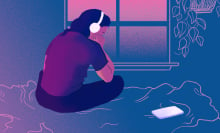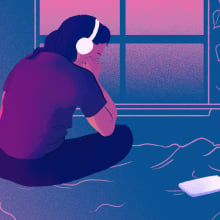Imagine letting a child or teen to see a movie without any guidance about the film's appropriateness for their age. You might settle into an animated feature that surprised you and your 8-year-old with nonstop profanity. Or discover that the action flick your 13-year-old watched depicted graphic sex.
Parents typically like to avoid exposing their kids to inappropriate content and count on movie and TV ratings, however imperfect, to help them do exactly that. But as mental health advocate and fashion designer Kenneth Cole argues, parents have no such resource or guideline when it comes to the internet, which is where their kids and teens spend a significant amount of their time.
"We allow them to exist in this treacherous space with unfettered access to content anywhere, put out by anyone," Cole told Mashable.
That's why Cole, founder of The Mental Health Coalition, has convened a group of expert advisers, including in mental health and online safety, to create a "first ever" rating system across social media, search engines, and gaming platforms.
The Safe Online Standards for Kids' Mental Health (S.O.S) initiative launched Thursday with the ambitious goal of developing tested safety standards for youth and young adults ages 13-24. The multiyear project will begin piloting standards next year and aims to implement them in 2025.
Dr. Dan Reidenberg, a suicide prevention expert helping to lead the initiative, told Mashable that while there have been improvements to online youth safety features, much more work needs to be done. One area that he said deserves more attention is the ability of youth to direct message each other with bullying, violent, or threatening content.
Reidenberg noted that eventually standards could be developed around technology used to detect and block such content, and perhaps prevent it from reaching the intended recipient. (For many years, Reidenberg has served as an unpaid adviser to major tech companies on features to improve youth safety.)
Tweet may have been deleted
Reidenberg and Cole both emphasized that the initiative doesn't consider tech the "enemy." Instead, they hope to work in partnership with major tech companies, which they characterized as lacking common standards followed by the industry at large.
Cole said that it's "unreasonable" to expect the companies to adopt a best practice if their competitors decline to do the same. Ideally, he added, the companies subject to the standards would embrace them uniformly. In Cole's opinion, while the companies might see screen time decline upon following the standards, a universal approach would prevent a loss in market share.
While household names like Google have been supportive of the initiative, Cole said, it is not being supported with funding from tech companies, nor have the expert advisers declared related conflicts of interest.
Tech companies may be keen to join the initiative as a gesture of cooperation, particularly as they look to retain the protection of a longtime federal law known as Section 230. The provision largely immunizes the companies from responsibility when their users post inappropriate or violent content, or when they harm each other.
Reidenberg said that the initiative would consider every aspect governing online safety, including Section 230.
"I think we need to look at everything," he said.
In the future, Cole said there could be an enforcement mechanism created by legislators. Currently, a patchwork of state laws aim to enhance online youth safety; some of those bills have been challenged by tech companies. Proposed federal legislation would, among several measures, impose penalties for companies that expose children to harmful content and crack down on advertising to minors.
The initiative's launch comes in the wake of a Surgeon General advisory on the risks and harms of social media use, as well as new guidelines on social media use issued by the American Psychological Association.
Among the initiative's experts are Dr. Mitch Prinstein, chief science officer of the American Psychological Association; Dr. Matthew K. Nock, a Harvard University psychologist and researcher; and Larry Magid, CEO of the nonprofit Connect Safely.
The Mental Health Coalition includes members such as The Trevor Project, the American Foundation for Suicide Prevention, the National Alliance on Mental Illness, and the Child Mind Institute.
For more Social Good stories in your inbox, sign up for Mashable's Top Stories newsletter today.
Topics Mental Health Social Good Social Media





























